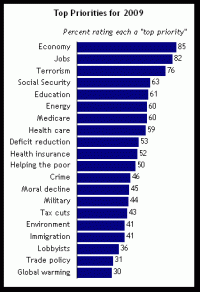Pew Research Center
As Barack Obama takes office, the public’s focus is overwhelmingly on domestic policy concerns - particularly the economy. Strengthening the nation’s economy and improving the job situation stand at the top of the public’s list of domestic priorities for 2009. Meanwhile, the priority placed on issues such as the environment, crime, illegal immigration and even reducing health care costs has fallen off from a year ago.
While it is not unusual for the public to prioritize domestic over foreign policy, the balance of opinion today is particularly one-sided. Roughly seven-in-ten Americans (71%) say that President Obama should focus on domestic policy, while just 11% prioritize foreign policy. By comparison, last January, 56% cited domestic policy as most important while 31% said Bush should focus on foreign policy.
The latest national survey by the Pew Research Center for the People & the Press, conducted Jan. 7-11 among 1,503 adults on cell phones and landlines, finds that strengthening the economy and improving the job situation are higher priorities today than they have been at any point over the past decade, and the recent upward trend has been steep. The share of Americans saying that strengthening the nation’s economy should be a top priority has risen from 68% two years ago to 75% last January to 85% today. Concern about jobs has risen even more sharply. The 82% who rate improving the job situation as a top priority represents a 21-point jump from 61% a year ago.
Of the 20 issues people were asked to rate in both January 2008 and January 2009, five have slipped significantly in importance as attention to the economy has surged. Protecting the environment fell the most precipitously - just 41% rate this as a top priority today, down from 56% a year ago. The percentage rating illegal immigration as a top priority has fallen from 51% to 41% over the past year, and reducing crime has fallen by a similar amount (from 54% to 46%). And while reducing health care costs remains a top priority to 59% of Americans, this is down 10-points from 69% one year ago.
The public’s interest in many other policy areas remains relatively stable, by comparison. Roughly three-quarters (76%) say that defending the country from future terrorist attacks should be a top priority, making it the third highest priority among the 20 issues tested in the survey. As recently as two years ago, terrorism ranked at the top of the list of policy priorities. The share of Americans who rate terrorism as a top priority has not changed substantially in recent years; the issue has simply been leapfrogged by the economy and jobs at the top of the list.
The 15-point decline in the percentage calling environmental protection a top priority this year is steep, but not unprecedented given the broader shift in public priorities. Between January 2001 and January 2002, the proportion rating environmental protection as a top priority fell by a similar amount (from 63% to 44%); a number of domestic priorities declined in importance following the Sept. 11 terrorist attacks. By January 2003, just 39% called environmental protection a top priority - comparable to today’s 41% - before resurging as a priority from 2006 to 2008, only to fall again this year.
The decline in the percentage calling environmental protection a top priority crosses partisan and demographic lines. For instance, only about four-in-ten women (43%) and men (39%) now say that protecting the environment should be a top priority; last January, 57% of women and 55% of men rated environmental protection as a top priority. Read more here.

See larger image here.


